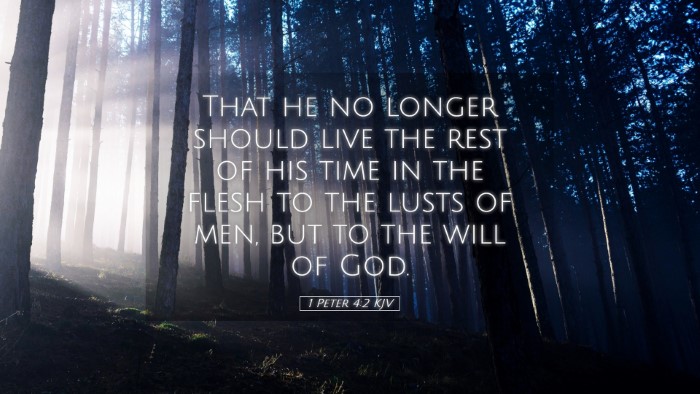Old Testament
Genesis Exodus Leviticus Numbers Deuteronomy Joshua Judges Ruth 1 Samuel 2 Samuel 1 Kings 2 Kings 1 Chronicles 2 Chronicles Ezra Nehemiah Esther Job Psalms Proverbs Ecclesiastes Song of Solomon Isaiah Jeremiah Lamentations Ezekiel Daniel Hosea Joel Amos Obadiah Jonah Micah Nahum Habakkuk Zephaniah Haggai Zechariah Malachi1 Peter 4:2
1 Peter 4:2 KJV
That he no longer should live the rest of his time in the flesh to the lusts of men, but to the will of God.
1 Peter 4:2 Bible Commentary
Commentary on 1 Peter 4:2
Verse: 1 Peter 4:2 - "That he no longer should live the rest of his time in the flesh to the lusts of men, but to the will of God."
The verse presents a crucial understanding of the Christian life, delineating the transformative shift that occurs when a believer embraces their faith in Christ. This commentary synthesizes insights from notable public domain commentaries to provide a profound interpretation suitable for pastors, students, theologians, and Bible scholars.
Contextual Background
Peter's epistle is addressed to Christians experiencing trials and persecution. The essence of his message is to encourage believers to endure suffering while living righteously. The broader message of 1 Peter emphasizes the call to holiness and separates the believer's conduct from worldly desires.
Verse Analysis
1. The Call to Transformation:
- Matthew Henry elaborates that this verse signifies a radical change in lifestyle; the believer, once driven by sinful desires, is now called to live in alignment with God's will. The term "no longer" emphasizes a clear distinction between the believer's past and present.
- Albert Barnes comments on how the verse implies a complete turnaround. The phrase "should live the rest of his time in the flesh" indicates that life's remaining days are to be used for godly purposes, suggesting a stewardship of time rather than indulgence in sin.
- Adam Clarke notes that living “to the will of God” encapsulates the essence of a mature Christian life. The believer is to prioritize divine objectives over personal cravings, echoing the theme of surrender that marks the Christian journey.
Understanding 'the Flesh'
In this context, "the flesh" symbolizes not just the physical body, but more importantly, the sinful nature that inclines man towards worldly desires.
- Matthew Henry asserts that the "lusts of men" indicate a propensity toward sin that is natural to the unregenerate heart. He stresses that regeneration by the Holy Spirit liberates believers from this bondage.
- Albert Barnes expands on this notion by detailing how the flesh desires things contrary to God's intentions. He emphasizes that a life wholly devoted to God's will is a true mark of spiritual maturity and authenticity.
- Adam Clarke emphasizes the importance of mortifying the flesh, guiding readers to understand that true strength comes from submission to God's will, resulting in the believer living out their faith authentically.
Living According to God's Will
The second part of the verse, "but to the will of God," is essential for understanding a believer's ethical framework.
- Matthew Henry reflects on how God's will is a guiding principle of holiness. He notes that living according to God's will means seeking to please Him in all actions, underlining the necessity of obedience as evidence of true faith.
- Albert Barnes asserts that knowing and aligning with God's will is fundamental to the Christian experience. This pursuit entails a continual learning process where believers cultivate an understanding of God's desires through prayer, study, and community.
- Adam Clarke provides insight into how seeking God’s will also involves sharing the good news of Christ. He highlights that a purposeful life includes not just passive obedience but active participation in God's mission on Earth.
Practical Applications
This verse yields several practical implications for contemporary believers:
- 1. Self-Examination: Believers are encouraged to assess their lives, identifying areas where the flesh has influence and seeking to surrender these to God's control.
- 2. Prioritizing God's Will: Making intentional choices that reflect an understanding of God’s desires, focusing on spiritual growth rather than fleeting pleasures.
- 3. Community Engagement: Engaging in the church and surrounding communities as an expression of living according to God's will through service, love, and evangelism.
Conclusion
In summary, 1 Peter 4:2 encapsulates the heart of the Christian transformation, urging believers to eschew the former lusts of the flesh in favor of a life wholly dedicated to God's will. The insights from Matthew Henry, Albert Barnes, and Adam Clarke reinforce the importance of this transition as foundational for spiritual maturity and a practical expression of faith.


